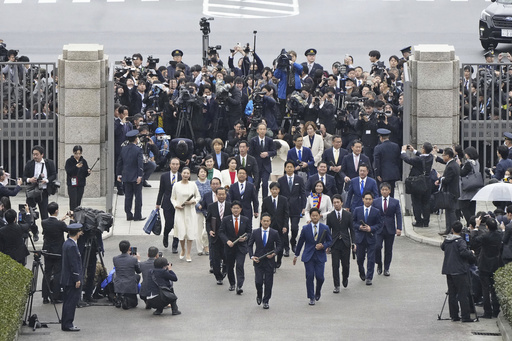
TOKYO — Following a significant electoral setback, Japanese Prime Minister Shigeru Ishiba is set to face an impending parliamentary vote on Monday, where he is expected to maintain his position as leader. His ruling coalition, composed of the Liberal Democratic Party (LDP) and its junior ally Komeito, experienced a notable decline in seats during the recent October 27 election, losing their majority in the influential 465-seat Lower House. This outcome has triggered public dissatisfaction, largely fueled by ongoing concerns regarding financial misconduct linked to his government and an insufficient response to these issues.
On Monday, a special parliamentary session will be held to select a new leader, with a mandatory vote required within 30 days after a general election. Historically, these votes have garnered little attention given the LDP’s stronghold on power, making the re-election of its leader almost a formality. However, Ishiba is anticipated to engage in a competitive runoff against Yoshihiko Noda, the prominent leader of the opposition.
In a routine procedure, Ishiba together with his cabinet members submitted their resignations earlier in the day to pave the way for their reappointments. Following his expected victory, Ishiba plans to unveil his second cabinet, which will include new appointments for three ministers who either lost their seats in the election or were impacted by its results.
Despite the election loss, Ishiba has expressed his determination to remain in office, indicating his willingness to collaborate with additional coalition partners to enhance stability and advance the LDP’s policy agenda. Meanwhile, Noda, leading the centrist Constitutional Democratic Party of Japan, has attempted to form a coalition among opposition parties, although his efforts have not yet succeeded.
Ishiba is likely to encounter challenges in the upcoming months as he will need to secure the opposition’s approval on various legislative measures, such as the national budget. He is particularly focused on engaging with the rising Democratic Party for the People, a smaller conservative party whose representation surged to 28 seats under the leadership of Yuichiro Tamaki, who studied at Harvard and previously worked in the Finance Ministry.
Tamaki has put forward proposals to enhance the basic tax-free income threshold and improve net wages, issues that resonated well with younger voters and those with lower incomes during the election. However, he has stated his preference to cooperate on specific policies with Ishiba’s party rather than forming a formal coalition, as he aims to leverage his party’s position to gain influence ahead of future elections.
In recent developments, Tamaki faced scrutiny due to a magazine article revealing his extramarital affair, which he confirmed, adding another layer of political turbulence. As Ishiba prepares for important international engagements later this month, including ASEAN and Group of 20 summits, he may also have the opportunity to meet with U.S. President-elect Donald Trump during his journey back to Japan.
